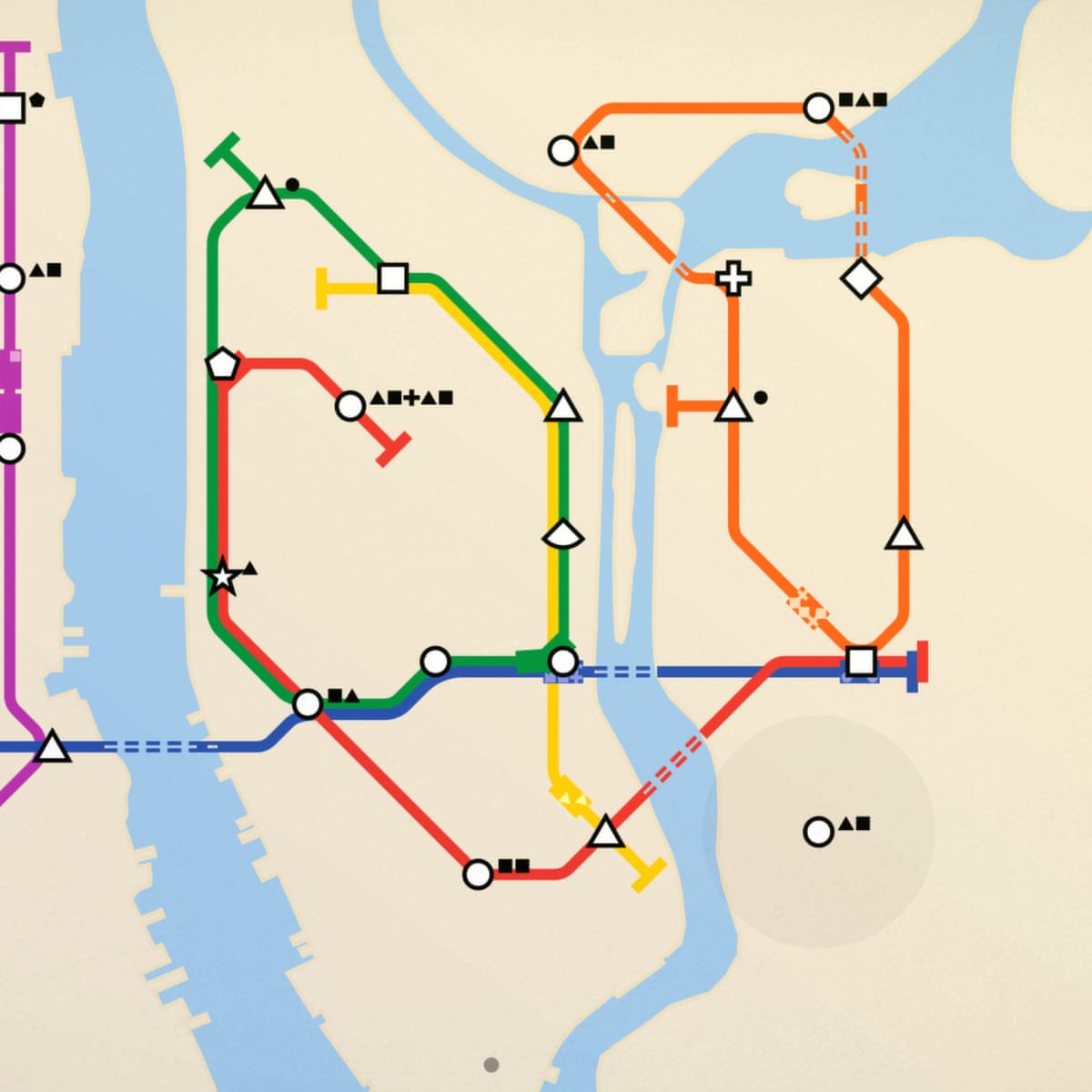Your goal is to build a big subway network and bring passengers to their destinations. Click and drag between two shapes to build a subway line between those stations. The small shapes above each station represent passengers who want to go to a particular type of station. Mini Metro: London. Your goal is to build a big subway network and bring passengers to their destinations. Click and drag between two shapes to build a subway line between those stations. The small shapes above each station represent passengers who want to go to a particular type of station. Every Sunday, you'll get new trains.
Mini Metro, the sublime subway simulator.
Mini Metro is a strategy simulation game about designing a subway map for a growing city. Draw lines between stations and start your trains running. As new stations open, redraw your lines to keep them efficient. Decide where to use your limited resources. How long can you keep the city moving?
Screenshots & video
FAQs
My home city isn't in the game! Can you add it?

We get asked this a lot! Which cities we add next depends on a lot of things, such as the layout of the rivers and coastlines as well as how many maps we have from the region. You can post your suggestions here: https://community.dinopoloclub.com/t/city-suggestions
I've bought the game on one platform, can I get it on another?
Unfortunately this goes against the terms of service of all major platforms, sorry! They require their cut of the sale price to fund the platform services.
More support questionsPress pack
Are you here for the juicy scoop on this fab game? Follow this handy dandy link to find out more:
Press packBuy Mini Metro
Mini Metro
Mini MetroA lot of indie games claim to be great for killing 10-15 minutes as needed—and so many of them miss the mark. Mini Metro doesn’t even make that claim, but is the perfect example of such a game. I’ve never played a game that’s so engaging yet so relaxing at the same time, until now.
The Premise
Mini Metro is a strategy/puzzle game that puts you in the role of a subway designer who connects subway stations together using tracks.
Each station has a particular shape, but not necessarily a unique one. Over time, stations generate passengers who each have a shape pertaining to which station they want to go to as their destination.
Stations are connected together using lines that you draw, which represent subway tracks, and each line starts with one train on it that automatically travels from one end of the line to the other, back and forth, picking up and dropping off passengers as the train arrives at stations along the route.
Here’s where the puzzle elements come in:
Each line can connect as many stations as you want, but you’re limited to a certain number of total lines. Each train has a passenger limit and can’t take on additional passengers until boarded ones are dropped off.
Over time, more stations pop into existence, so you’re constantly expanding your subway network. If your network is too inefficient and waiting passengers grow impatient, you lose.
The game also has a passage-of-time mechanic that takes you through each day of the week, and every Sunday you’re given a choice between upgrades: Maybe you want an additional line, or maybe you want to add passenger capacity to a train, or maybe you need bridges so you can extend a line over a river (yes, there are bodies of water). These upgrades help you deal with the extra pressures that come as more stations pop into existence.
It all sounds rather simple, but that’s the beauty of Mini Metro. Because the gameplay is automated, you aren’t actually “doing anything” most of the time, hence the relaxing aspect.
Yet at the same time, you’re always looking for spots where you can improve your subway network’s efficiency, which keeps you mentally engaged.
Mini Metro Strategy
Mini Metro games usually last anywhere from 10-20 minutes, but there’s also an Endless mode where you can’t lose no matter how long passengers have been waiting. If you lose a Normal game, you have the option to switch into Endless mode and keep going from the point when you lost.
The Good
The thing you’ll first notice about Mini Metro is the art style: hyper-minimalistic, abstract in the truest sense. The entire game is just colored shapes and lines—that somehow all make sense when you see it action.
The minimalism fits so perfectly with the calm pace of the game, and the soft ambient music seals the deal. Usually you can tell when a game’s minimalistic approach is borne out of laziness or lack of funds, but Mini Metro makes the most of it.
I love that the trains are automated and the player doesn’t have to “do” anything except draw lines from station to station.
The game requires zero dexterity to play, which is an excellent design decision because this is, when you boil it down to its essence, a peaceful thinking game.
And in fact, learning to manipulate the automated systems is part of what makes it so interesting to play.
There are 20 cities (i.e. stages) you can play, where each city has its own subway quirks.

One has a river running through the center, another has trains that can only hold four passengers rather than the usual six, and another is busier than usual so new stations spawn more frequently than in other cities.
The gameplay itself doesn’t change, but these subtle variations do shift the difficulty in different directions, albeit slightly.
What’s genius is that you can’t actually win a game of Mini Metro. The point is to see how many passengers you can successfully deliver to their destinations before your subway network becomes overloaded and collapses, meaning the game only ends when you lose.
By not providing a finish line for you, Mini Metro turns you into your own finish line—your only aim is to beat your best score for a given city. It’s genius because it’s self-regulating: as you get better at the game, the goalposts move with you.
Combined with the station spawning mechanic, the level of challenge is exactly right for you every time.
Lastly, I appreciate the inclusion of the fast-forward feature, which lets you speed up the passage of time so you don’t have to twiddle your thumbs through the easy (and admittedly boring) few minutes at the beginning of every new game.
The Bad
I actually got a chance to play an alpha version of Mini Metro back in 2013, when it was submitted as an entry in Ludum Dare (a game development jam) and titled Mind the Gap. It was a web game back then, and nowhere near as polished as it is now.
I bring this up because it means I already knew how to play Mini Metro when I got it in its finished form.
For someone who’s never heard of or seen this game before, learning the ropes can be a bit of a head-scratcher. While the abstract graphics make sense, you’re never quite told what to do.
It’s a simple game, but figuring it out without guidance can be perplexing. For the longest time I had no idea the game even had a tutorial because it’s tucked away in the corner of the options menu.
My only major complaint about Mini Metro is that the gameplay fails to fully explore the premise’s potential. The main mechanics include: lines, trains, carriages, bridges/tunnels, and an interchange upgrade that speeds up the loading and unloading of passengers at a specific station.
That’s it. It’s a bit too shallow and simplistic, even though it definitely works as is.
Don’t get me wrong: it’s fun despite the simplicity. But even though the 20 cities have their subtle variations, the gameplay itself has no variety.
Playing Mini Metro in Cairo is the exact same as playing Mini Metro in Berlin, and it makes me wonder why different cities even exist. It would’ve been great if each city had its own unique mechanic for the player to learn and master.
I can’t think of any example mechanics off the top of my head, but hey, that’s not my job, is it?
So while it’s a solid game for chilling and relaxing, it doesn’t have enough to captivate for long sessions. It’s fun for a game or two, but quick to grow stale and you’ll want to move onto something else. The urge to play will come back, of course, and it’ll be fun for another game or two, but then stale again. Rinse and repeat.
The Verdict
Mini Metro has a Daily Challenge mode where a particular city is chosen for all players to compete on, with a global leaderboard that ranks participants based on how many passengers they successfully delivered.
You can play as many times as you want. The geography is always the same but the station spawns aren’t. It’d be great if we could see replays for top scorers, but alas, that’s not a feature.
There’s also an Extreme mode, where every decision you make is final. Once a track is laid, you can’t change. Deployed trains and carriages can’t be swapped to other lines. The game is hard enough for me in Normal mode so I’ve only played Extreme mode once, but hardcore puzzlists (and masochists) will appreciate it.
The one big downside is that you can get seriously boned by randomized station spawns, and that can be super frustrating because it’s out of your control.
Overall, Mini Metro is a smartly designed game with simple but clever mechanics and a wonderfully tranquil atmosphere. It’s the kind of game I’ll always keep installed, just so I can load it up and play a round whenever I need to decompress or take my mind off of things for a quick breather.
Mini Metrology
Mini Metro Cool Math Games
- Beautifully minimalistic graphics
- Mentally engaging but not stressful
- Difficulty scales with your skills
- Daily Challenge is fun for competitive players
Mini Metro Online
- Gameplay is addictive but shallow
- Maybe a bit too abstract?